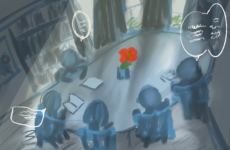When I was little, visits to the library with my mom always frustrated me. “I don’t wanna listen to Little Women,” I would whine, “Can’t we just get Magic Tree House?” But my mom persisted, and my childhood car rides were spent listening to the audiobook of Louisa May Alcott’s Little Women. After a few library renewals and a month of listening, we finally finished the book. I didn’t take away much from the story: I knew that I loved Jo, hated Amy, and would rather read Magic Tree House.
But as I’ve gotten older, I’ve realized that Little Women, which was published in 1868, was a tale ahead of its time. I’ve started, finally, to appreciate my mom’s insistence on sharing it with me. Some sentences seem to jump off the page with striking modernity, lines that seem far from 19th-century Pennsylvania. For example, Jo’s iconic line, “I don’t like to doze by the fire. I like adventures, and I’m going to find some,” is an obvious contrast to the knitting, housewife female stereotype of the time. And yet, the frustrations that Jo and Alcott faced as women still persist. After all, Little Women was nominated for several Academy Awards and Oscars, including Best Picture, Costume Design, Score, and Actress in a Leading and a Supporting Role, and yet, Gerwig was not nominated for Best Director, a category that, once again, is filled entirely by men.
So, when I heard that another film adaptation was coming out and that its cast would feature some of the best actors working today — including Timothée Chalamet, Emma Watson, Laura Dern, and Meryl Streep — and that it was directed and written by Greta Gerwig, I was nervous. What if the film was a flop (cough, cough Cats)? What if it forever tarnished the story that I had grown up with?
After seeing it twice in theater, though, I can safely say that Gerwig’s version of Little Women was not only did justice to the original, but was fresh and revolutionary in its own right.
Perhaps the factor that saves Gerwig’s rendition from being another forgettable adaptation in a long line of TV shows, movies, and even anime was her emphasis on the parallel between Alcott and Jo. In her version, Gerwig gives Jo a book (one that she begins to write after Amy burns Jo’s first novel). The movie opens with Jo being told that if she wants to sell a story about a woman, she must ensure that she is either married or dead by the end, a direct allusion to the pressure Alcott felt to change her content and make money as a female author. In fact, in Gerwig’s movie Jo utters a line from Alcott’s journal: “I can’t afford to starve on praise.”
A thread of Alcott’s own life is carried out throughout the movie as Jo grapples with her identity and what felt as a preordained fate as a woman. In her script, Gerwig borrows a line from another one of Alcott’s books, Rose In Bloom: “Women have minds, as well as just heart; ambition and talent, as well as just beauty. And I’m so sick of people saying love is all a woman is fit for.”
By the end of the film, just as the audience expects Jo to marry boring Professor Bhaer, Gerwig cuts to a scene in which Jo proposes her book to a publisher, who is weary of Jo’s ending featuring an unmarried and childless female protagonist. Jo compromises and allows her main character to marry the professor, and the movie implies that Jo, herself, remains single. In this way, Gerwig brilliantly allows space for both the ending Alcott was forced to pen and the one Alcott wished to have written.
These parallels further emphasize the modern feeling of the writing. In so many movies set in the nineteenth century, characters of all ages talk like old men who wear their glasses on the tips of their noses. But the reality is, children in the 1860s didn’t address each other as “Good sir.” Refreshingly, Gerwig’s writing is snappy and allows for the timeless themes of the story to shine through.
Although the entire cast was dynamic and exciting to watch, Pugh’s acting as Amy stands out. Her youthful energy, just on the verge of being too eccentric, and ability to mold Amy over Gerwig’s overlapping time sequencing colorized a time period often remembered in black and white.
Between the acting, writing, pacing, and costuming, there’s so much to love about Gerwig’s fresh take on Little Women — one that proves that this classic novel, the same one that my mom forced me to listen to as a little girl, is still relevant and pressing.





